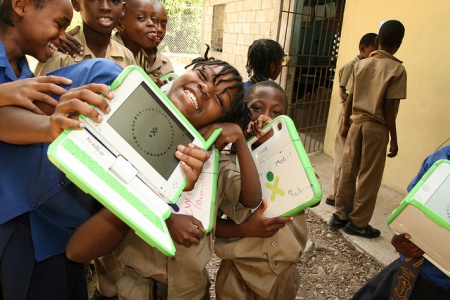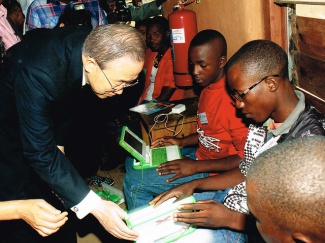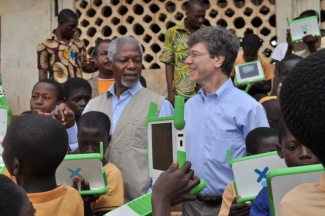Islands
- http://www.un.org/en/events/observances/years.shtml
- http://www.sids2014.org/
- Remember: 2008–2017 Second United Nations Decade for the Eradication of Poverty
- Remember: 2005-2014 Second International Decade of the World's Indigenous People (2005-2014)
- Remember: The 2012 theme: "Indigenous Media, Empowering Indigenous Voices", a topic to which OLPC aligns closely.
- ..
The viewpoints expressed hereunder do not necessarily reflect the opinion of OLPC.
This page was created by a member of the free volunteer community supporting OLPC.
Welcome to the starting page on OLPC / OLPC Community link Islands
This website is a collaborative website in which you can create a login and then edit and add the pages. This tool is made available by the One Laptop Per Child not for profit. This is an "Open Community" project, similar to the Wikipedia, wikibooks and Open Source Community projects, like Linux, OpenOffice, etc. and it is working along Agenda 21 and Millennium Development Goal nr.2: Bringing Universal Primary Education. To edit text on this page or add pages, log in and and "edit page / save page" button will appear.
- 2' video - OLPC Intro part 1
- 2' video - OLPC Intro part 2
- 7' video: Impact on teachers, parents, kids, society.
The aim of this educational project, is on one hand to bring Universal Primary Education by 2015 as - anno year 2000 initiated - United Nations Millennium Development Goal nr.2. On the other hand, OLPC's mission is to manage the open hard and software project, to bring forward the best possible laptop combination for education: the XO-XServer combination. For this and above approach, - and also a lot of lobbying by the right persons on the right places and time - the United Nations is a Partner in this Open Community project! It is the largest educational project undertaken by Humanity ever, and deemed by many as one of the most inspiring projects out there. 2008, saw the first countries with a 100% roll out to all of their kids aged 5 till 15: Peru, Uruguay. Several Island States now have a 100% deployment too; Rwanda and Australia are following at fast pace too. Every XO can load over 100 ebooks on its memory and has a choice of over 86.000 eBooks available, as well as many (educational) games, all education disciplines covered, etc. etc.. things are moving fast indeed.
In Islands, it makes a LOT of sense to distribute PV solar powered OLPC XO-XS laptop to tablets
- In Islands there is probably a high potential for a successful PV solar powered the OLPC XO-XS laptop to tablet deployment.
- Islands are very confined, delimited areas, so it is very possible to make sure ALL kids have an XO-XS and PV panel. One of the pillars to make sure they don't get stolen: every body has one anyhow.
- The XO-XS and its portable-flexible PV panel cost about 190 € (2013)/XO.PV panel and 7 years life span = 27 €/kid.year ; with that you have 1000 books/XO and the PV panel can also become a source of revenues, e.g. for charging mobile phones.
- There is not a lot to do in Islands. The XO-XS holds over 1000 ebooks per XO, thus ALL the books and exercise books of all the years in a kids' school career and much much more.
- The XO-XS put themselves in an inter/intra-net automatically. Thanks to their double antenna's, everybody is reachable directly within about 200 m and via hopping using other XO's as a bridge - a feature that comes automatically with every XO, using the spare background calculation power of the XO, just about everybody can video-talk with each other in the camp or exchange/tap into the books of the others. Of course we put an identical series of books - about 100 - on every laptop, but the 900 spare ebook capacity we fill-up with 900 other books, so the whole refugee camp has 900 books times the number of laptops = several tens of thousands of free ebooks in a shared library folder.
- In the 1000 ebooks that come on every XO, there can be many ebooks that are very useful in refugee camp situations: some books explain about the importance of hygiene, washing hands, how to make soap from waste edible oil, making bale and rammed earth houses, solar powered cooking, improved stoves using less wood, purifying water using clay and a mixture of saw dust, how to treat wounds and diseases, ..., maybe the XO's antennas allow the XO's to connect to an external internet.
- the XO-XS offer a great basis for usb plug in stethoscopes, usb plug in echography, ... hence remote medicine support.
- it is very important to the kids to be able to continue their school career and graduate, so they can move to the next level. In several conflicts involving e.g. war childs, it is part of the strategy to destabilize society and the school system, so kids can't graduate and are fed-up having to do the same grade over and over again. The militia await these kids with open arms and a "great" offer to enter their militia and build a "career" there ... read become slaves.
- An XO-XS deployment and the 1000 books are given to the kids, but they take them to their families. The books are a great moral booster for all.
- The budget for the XO-XS deployment can be quite easily calculate
- An XO-XS deployment can be organized fast: in a matter of weeks/2-3 months.
- The open source community and OLPC has enough leads to teams that are willing and have the skills to set-up an XServer and even make it happen there is an internet connexion with the rest of the world.
When you are working on a page regarding islands, just add Category:Islands between double squared brackets at the bottom of your page. That way your page gets automatically taken up in the "category Islands page" and can be detected by others working on the same topic and you may team up.
To find out where there are islands,
- click the category Islands to get an overview page and who's doing what on Islands link OLPC.
- Education
- Education in emergencies
- Emergency communication
- Emergency management
- Emergency preparedness response
- Emergency telecom cluster
- Emergency market mapping analysis
Maybe there's quite some experiences that can be shared with refugee camps as they are also kind of like islands on their own amids a country /region of instability.




